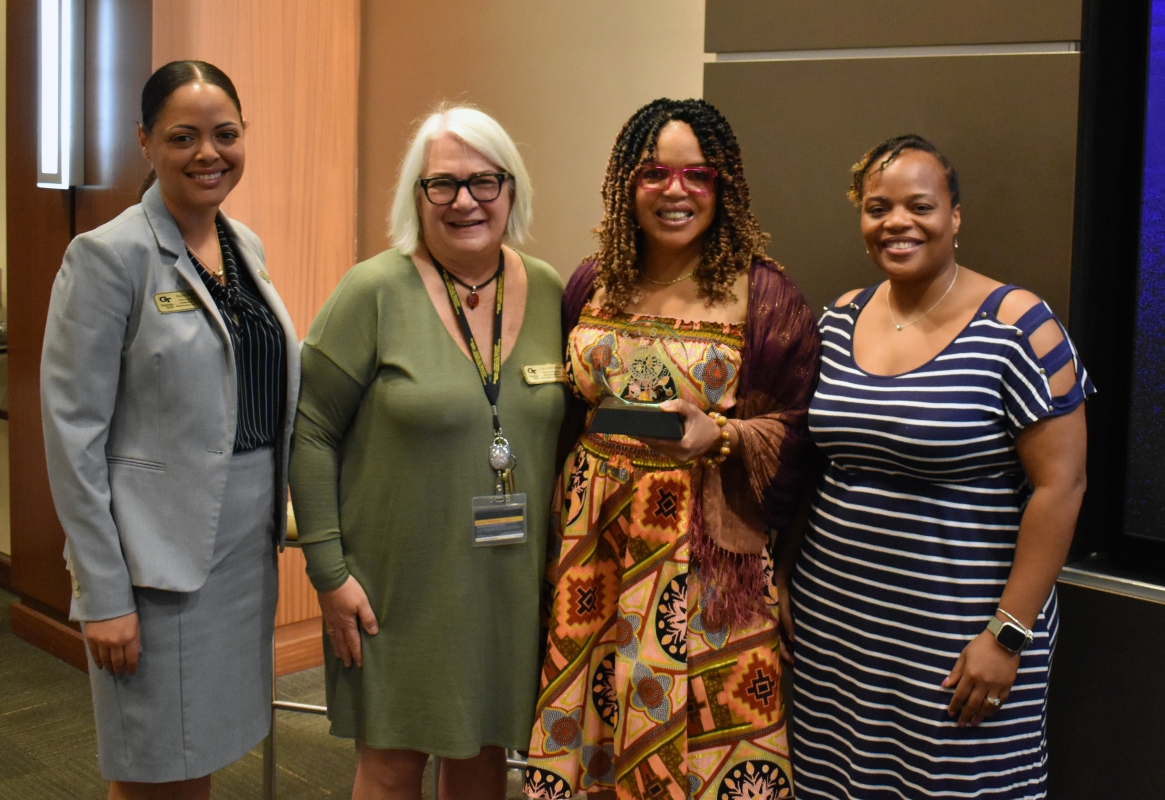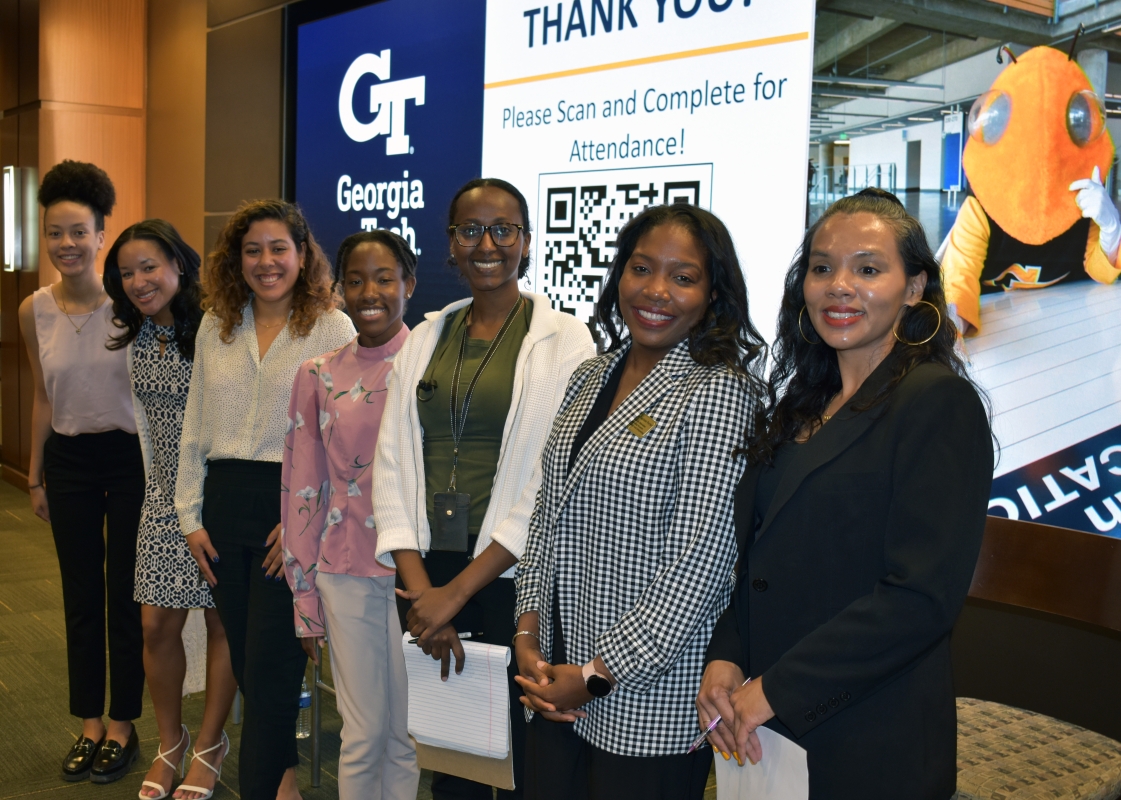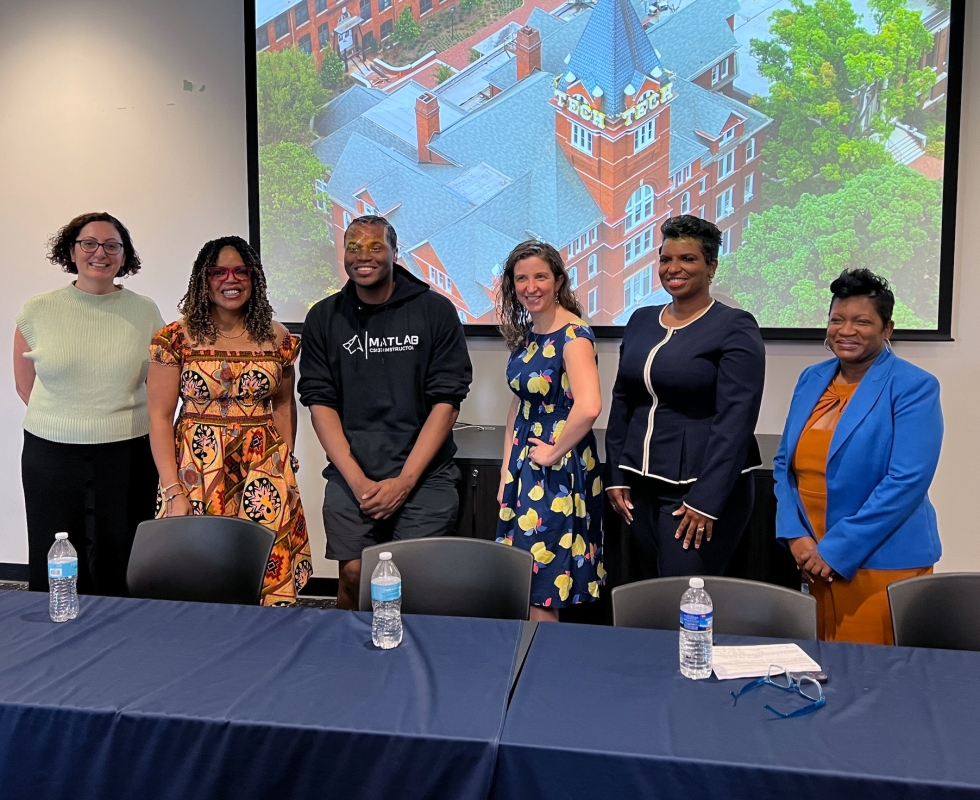June 12, 2023 | Atlanta, GA
More than 100 Georgia Tech and community members attended the inaugural STEM Equity Symposium hosted in late spring by the Center for Education Integrating Science, Mathematics, and Computing (CEISMC) in collaboration with the College of Engineering and the Office of Undergraduate Education Equity Collective. The one-day event included discussions on how to address the barriers to and solutions for inclusive teaching, research, and STEM education.
“Our goal is to provide programming that will foster a campus culture and climate that is welcoming for all students, faculty, and staff – especially in STEM disciplines. The STEM Equity Symposium represented a grassroots collaborative opportunity to proactively address these important topics,” said CEISMC Academic Professional Rayne Bozeman, who serves as co-chair of CEISMC’s Diversity, Equity, and Inclusion Taskforce. “We’re very appreciative of Georgia Tech leadership from the sponsoring organizations providing financial support. However, their symposium participation in the various discussions speaks volumes to their commitment and investment in diversity, equity, and inclusion efforts in higher education.”

L-R: Rayne Bozeman, Co-Chair of CEISMC’s Diversity, Equity, and Inclusion Taskforce; Lizanne DeStefano, CEISMC Executive Director; Ebony McGee, Keynote Speaker; and Nina Climes, Co-Chair of CEISMC’s Diversity, Equity, and Inclusion Taskforce
Ebony McGee, professor of diversity and STEM education at Vanderbilt University’s Peabody College, delivered the keynote address entitled, “Black, Brown, Bruised: How Racialized STEM Stifles Innovation.” She focused on the STEM education research she published in her newly released book of the same name.
“Despite the incredible diversity we have to pull from in the United States and world, a large majority of our science and engineering professionals in the U.S. are white or Asian,” said McGee, whose first career was in electrical engineering.
Drawing upon the narratives of hundreds of Black, Latinx, and Indigenous students and faculty, McGee examined the experiences of underrepresented racially minoritized (URM) students and faculty members who have succeeded in STEM and the mental, emotional, and physical toll that such success has exacted, especially when navigating difficult and challenging environments.
“With a lack of diversity comes a denial of the knowledge, skills, and values that other marginalized groups have to offer, and this can manifest in certain problems, people, research methods, and procedures being overlooked,” she said. “Certain trends in results can go unnoticed, different demographics can be left out of consideration, and assumptions thought to be universal might only apply to certain populations.”
McGee outlined several practical steps from her book that advocate for structural and institutional changes for increasing inclusion of URM students and faculty in the STEM fields as well as increasing URM students’ graduation rates and comfort, safety, and health. Her recommendations are:
- hiring more faculty of color in STEM faculty positions;
- implementing identity-conscious STEM mentoring programs;
- hiring counselors of color who specialize in the trauma experienced by STEM higher education students and faculty;
- creating pathways for people of color to pursue STEM entrepreneurship;
- retraining STEM faculty and industry leaders;
- acknowledging the work of STEM research educators; and
- respecting and properly funding Historically Black Colleges and Universities, Hispanic-Serving Institutions, and Tribal Colleges as the leaders of URM STEM student success.
“Educational researchers have begun to recognize the ‘diversity of difference’ as an integral part of the student learning experience in higher education,” McGee explained. “Together, with an increased demand for a workforce that is expected to interact within a global society, present the need for an increase in diversity efforts in K-12 schools.”
 A student panel, moderated by Annie Patrick, a postdoctoral researcher in the Coulter Department of Biomedical Engineering, followed in which the panelists shared their experiences navigating the STEM environment at Tech. The group of six included postdoctoral fellows Dyanne Baptiste Porter, CEISMC, and Naomi Deneke, Material Sciences and Engineering, Ph.D. candidates Adriana Mulero-Russe, bioengineering, and Alexis Pulliam, biomedical engineering, and undergraduates Miranda Merritt, biomedical engineering, and Assata Quinichett, computer science and Spanish.
A student panel, moderated by Annie Patrick, a postdoctoral researcher in the Coulter Department of Biomedical Engineering, followed in which the panelists shared their experiences navigating the STEM environment at Tech. The group of six included postdoctoral fellows Dyanne Baptiste Porter, CEISMC, and Naomi Deneke, Material Sciences and Engineering, Ph.D. candidates Adriana Mulero-Russe, bioengineering, and Alexis Pulliam, biomedical engineering, and undergraduates Miranda Merritt, biomedical engineering, and Assata Quinichett, computer science and Spanish.
Mulero-Russe, who is a graduate research assistant in the cellular and biomaterials engineering lab of Petit Institute for Bioengineering and Bioscience Executive Director Andrés García, said that participating as a panelist was an enriching event. She also previously served as president of the Latino Organization of Graduate Students (LOGRAS) at Tech, which promotes Latino and Hispanic leaders in STEM and community.
“I had the opportunity to hear the experiences of students from different levels, and how they have overcome challenges throughout their journey,” she said. “The presence of the administration from different offices across campus, including Dean Raheem Beyah from the College of Engineering, gave me the assurance that topics of diversity and inclusion, as well as students’ experiences, are important issues on our campus.”
Baptiste Porter, who is a part of CEISMC’s educational research and evaluation team, said that helping others has always been the center of her academic and career pursuits. She also is currently a Postdoctoral Leadership and Innovation Experience Fellow at Tech, which focuses on leadership and project management skills.
“I thought if I can learn mathematics deeply maybe I’ll have a chance to teach it in such a way that my students won’t be hindered by a fear of doing mathematics. Moreover, a deep understanding of mathematics could increase the likelihood that advanced mathematics courses necessary for majoring in STEM subjects would not serve as a ‘gatekeeper’ for students,” she said. “So, as a former teacher, when my students started returning from their first semester in college and mentioned that ‘calculus was a breeze’ it was worth the hard work. As a first-generation Ph.D. graduate, I have that same passion driving me to mentor first-generation Ph.D. students that also informs the type of research and the type of researcher I hope to become in engineering, mathematics and STEM education at CEISMC.”
While the morning session was open to the public, the afternoon session, consisting of a faculty panel, was developed as a professional learning community for employees of the units which sponsored the symposium. More than 50 people participated in the discussions that focused on best practices for implementing these inclusive practices in research, teaching, and service.
 The panel, moderated by Patrick and Baptiste Porter, included Georgia Tech faculty Meltem Alemdar, principal research scientist, CEISMC, Roxanne Moore, principal research engineer, CEISMC and Woodruff School of Mechanical Engineering, Kantwon Rogers, Ph.D. student in computer science and instructor, School of Interactive Computing, Charmaine Troy, associate director, First-Generation and Limited Income Student Initiatives, and Valarie Bennett, assistant professor of STEM education at Clark Atlanta University.
The panel, moderated by Patrick and Baptiste Porter, included Georgia Tech faculty Meltem Alemdar, principal research scientist, CEISMC, Roxanne Moore, principal research engineer, CEISMC and Woodruff School of Mechanical Engineering, Kantwon Rogers, Ph.D. student in computer science and instructor, School of Interactive Computing, Charmaine Troy, associate director, First-Generation and Limited Income Student Initiatives, and Valarie Bennett, assistant professor of STEM education at Clark Atlanta University.
Troy, who leads the Institute’s efforts in supporting the co-curricular success of first-generation college students, said that providing access and equity to underserved populations at an early age is critical in helping prepare them for the successful transition to college. The inaugural First-Generation College Institute, implemented as one-day events in Atlanta and Savannah in summer 2022, was hosted by CEISMC and the First-Generation and Limited Income Student Initiatives in collaboration with the Office of Undergraduate Admission and the Office of Scholarships and Financial Aid. The program returns as a residential three-day opportunity later this month.
“It is important that we continue to have these conversations about how we can advocate for and support our underrepresented populations in STEM,” said Troy. “I hope that our work continues to inspire first-generation students to pursue a career in STEM and that they inspire other students who come after them to do the same.”
Overall, the STEM Equity Symposium was an opportunity for the Georgia Tech community to explore these topics on a deeper level and provide opportunities for future discussions and collaborations. “As Georgia Tech strives to expand access and create a thriving and diverse educational community, it is critical that we listen to and learn from our students and faculty of color. Their stories are so powerful and their bravery in sharing them publicly is remarkable,” said CEISMC Executive Director Lizanne DeStefano.
—Joëlle Walls, CEISMC Communications


